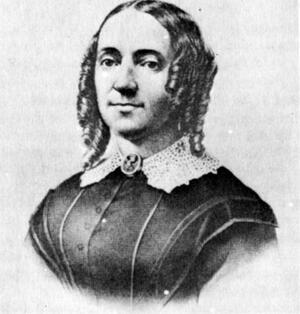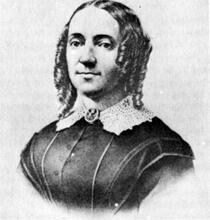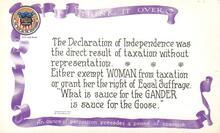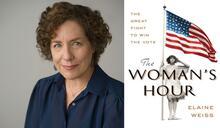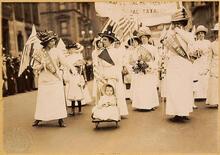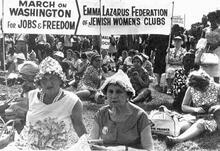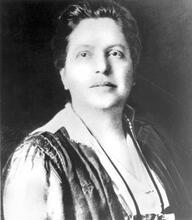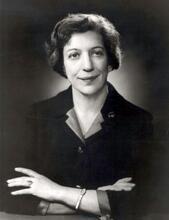Ernestine Rose
Ernestine Rose (1810-1892) was a pro-suffrage, anti-slavery orator in the United States whose activism was recognized by contemporaries as a key contribution to the suffrage movement.
This photo is in the public domain.
Ernestine Rose was an atheist, a feminist, and an abolitionist known as “Queen of the Platform.” Born in 1810 in Poland, she refused to marry the man her father had chosen for her. She then traveled to Berlin, Paris, England, and finally New York, where she began her political activity. By 1850, she was central to the women’s rights, anti-slavery, and free thought movements, in which she was the only foreigner, the only atheist, and the only Jew. Following the Civil War, she returned to England, where she continued her activism in the free thought and women’s movements. After her death in 1892, she was forgotten because of her status as an immigrant, an atheist, a radical, and a woman, returning to historical memory with the women’s and black history movements of the 1970s.
In the 1850s, Ernestine Rose was more famous than her co-workers Elizabeth Cady Stanton and Susan B. Anthony. Known as “the queen of the platform,” she had become the pre-eminent speaker of the early United States women’s movement. Her path to this acclaim was unique: born in Poland, this rabbi’s daughter became an atheist and an abolitionist, as well as a woman’s rights woman, as feminists were then known. Yet less than thirty years after her death in 1892, she was forgotten because of her status as an immigrant, an atheist, a radical, and a woman.
Early Life and Family
Rose was born on January 13, 1810, in the small city of Piotrkow Tribunalski, the site of the Polish supreme court from the seventeenth century until Poland was “partitioned” in the early nineteenth century, divided between Prussia, Russia, and Austria. In the 1600s, Poland was known as a “paradise” for Jews; when Rose was born, her birthplace was half Jewish and half Christian. (The oppressive Polish (Yiddish) Small-town Jewish community in Eastern Europe.shtetl arose later in the nineteenth century, leading many Jews to emigrate to the United States.)
Rose was the only child of Rabbi Potowski. All the Jewish papers from her city have been lost, so we know neither her parents’ full names nor her Hebrew name. “Ernestyna” was a contemporary Polish name, and she may have grown up as Ernestyna Potowska. She liked to say later that she “was a rebel from the age of five,” probably resulting from her experience at a Lit. "room." Old-style Jewish elementary school.heder, a Jewish elementary school. There she was punished for something she did not know was wrong, and when she complained about this injustice to her father, he decided to educate her at home. Rabbi Potowski treated her like a surrogate son, teaching her Hebrew and the Torah she-bi-khetav: Lit. "the written Torah." The Bible; the Pentateuch; Tanakh (the Pentateuch, Prophets and Hagiographia)Torah, normally forbidden to girls. When she asked questions, her father told her, “Little girls should not ask questions.” Since she knew little boys were supposed to ask questions, she dated her rebellion against strictures handicapping girls and women from this moment.
Leaving Judaism
At twelve, Rose lost her faith in Judaism; however, she continued to follow its practice for two more years. Then her mother died when Rose was about fifteen and left her money. Soon after, her father betrothed her to a man she did not want to marry and arranged that her fiancé would receive her money even if she did not go through with the wedding, Rose took her first major action against injustice. She hired a sleigh and arranged to travel sixty miles to the district court in Kalisz. The sleigh broke down in the middle of the night and the driver wanted to wait until morning for repairs. She insisted that he proceed, since her case would be heard the next day. Sitting alone, she heard the howls of wolf packs. The following morning, she pleaded her case in front of the district court. She won, received her money, and returned home.
On arrival, Rose learned that her father had married a girl her own age. Realizing she could not tolerate this situation, she gave her father an appreciable amount of her money and left her family, Poland, and Judaism forever.
Berlin, Paris, and London
Rose went first to Berlin, which had a community of liberal Jews. There she read “modern books” instead of the Bible and encountered Enlightenment principles, which remained her values for the rest of her life. The Enlightenment questioned tradition. Why should monarchy be the only form of government? Why should Jews be denied civil rights? Why should women be subordinated to men? After two years in Berlin, she moved further westward to Paris, where she witnessed the Revolution of 1830, which limited monarchy in France. She then went to England, where she encountered her new “father,” Robert Owen, a man whose ethics she embraced.
Owen was world famous when she met him in 1832. Born into the lower middle class, he became the owner of a large textile factory. Believing that workers would respond favorably to improved conditions, he created a model factory and town. He began to found similar communities in both Britain and the United States, addressed the U.S. Congress, and created a large British labor union. When Rose met Owen, his followers gathered every Sunday in London. There women were welcomed, allowed to take classes and to speak in public. She began her career as an orator in these socialist circles and met her future husband, the silversmith William Rose, there. They married in 1836 and decided to emigrate to New York, where they lived until 1869.
Women’s Rights, Anti-Slavery, and Free Thought
There, Ernestine Rose began her political activity. She debated both in Owenite circles and public meetings and carried a petition demanding married women’s property rights around lower Manhattan. (Legal doctrine in that era held that “man and wife were one person and that person was the man.”) In the early 1840s, Rose gave birth to two children, both of whom died as babies. By the mid-1840s, she began campaigning for free thought, abolition of slavery, and women’s rights.
By 1850, Rose had become central to the early women’s rights movement, which held yearly conventions attracting thousands of people. In these circles, as well as anti-slavery and free thought communities, Rose remained unique. She was the only “foreigner,” as non-native born Americans were called, the only atheist, and the only Jew. Despite these handicaps, she helped lead this new movement. She travelled from Maine to South Carolina and from the East Coast to Iowa, sponsoring women’s rights. She also attended many abolitionist and free thought rallies.
Rose’s life and her causes became much more difficult once the Civil War began in 1861. Her movements ceased meeting and Rose herself experienced antisemitism from a new source, the free thought newspaper the Boston Investigator. She had been good friends with its editor, Horace Seaver; he frequently published her speeches and writings and extolled her beliefs. Free thinkers routinely denounced the “ancient Hebrews,” whom they believed created religious bigotry. But Seaver now wrote condemning contemporary American Jews, arguing they should be expelled from the United States. “I thought I smelled brimstone, genuine Christian brimstone,” when reading the piece, Rose wrote to Seaver. They debated this issue for four months, after which Rose did not contact the newspaper for five years.
Return to England
During the late 1860s, Rose’s health worsened and feminism split over the issue of “the black man’s vote.” Should only former male slaves be enfranchised, or all men and women? After the 14th Amendment added the word “male” to the Constitution for the first time, the women’s movement split between those who supported the vote for all and those who backed the vote just for men. In 1869, Ernestine and William Rose decided to return to England to live.
After visiting various spas and resorts, Rose’s health improved and she became active in both the British free thought and women’s movements. She spoke, she wrote, she participated in meetings. She became close friends with a number of freethinkers and feminists, especially the Bradlaugh family, Charles and his two daughters, Alice and Hypatia. These friends supported her through the great tragedy of her life: William’s death in 1882.
Both Stanton and Anthony visited Rose in England after William died. She remained as active in her causes as her health permitted: sending money, writing letters, supporting new activists. Fearing that Christians would try to convert her on her death bed, a not uncommon practice in those years, she arranged for Hypatia Bradlaugh to be with her when she died. Hypatia did not arrive in time, but Rose’s doctor arranged for a peaceful death on August 4, 1892. Many attended her memorial service. She was buried in Highgate Cemetery next to William. A number of tributes followed, both in Great Britain and the United States. One she might have especially appreciated came from a United States feminist of the next generation, who declared, “The liberal laws which we now live under are due to the tireless exertions of this gifted women and never ought the women of New York to forget the debt of gratitude they owe to Ernestine L. Rose.”
They did forget, however, as did almost everyone else. A 1927 article in the Jewish Forward declared that few had ever heard of her. As a Jew, a foreigner, an atheist, and a woman, Rose did not fit into the history of the first half of the twentieth century. In 1871, the Boston Investigator had predicted—correctly—that Ernestine Rose would be appreciated “in about a hundred years.” The women’s and black history movements of the 1970s contributed to restoring her life.
Ernestine Rose embodied female equality in both her everyday life and her political activism. She was a true pioneer, working for the ideals of racial equality, feminism, free thought, and internationalism. Although some of her causes succeeded, many remain to be won. Immigration is still controversial. People still fight over women’s and free thought rights. But in 2012, 54% of Americans said they would vote for an atheist for president. As Rose often declared, “The world moves.”
Anderson, Bonnie S. The Rabbi’s Atheist Daughter: Ernestine Rose, International Feminist Pioneer. New York: Oxford University Press, 2017.
Barnard, L[emuel] E. “Ernestine L. Rose.” The Liberator, May 16, 1856.
Conrad, Charles. “Ernestine Rose.” In Women Public Speakers in the United States, 1800-1925: A Bio-Critical Source Book, edited by Karlyn Kohrs Campbell, 350-368. Westport, CT: Greenwood Press, 1993.
Doress-Worters, Paula, ed. Mistress of Herself: Speeches and Letters of Ernestine L. Rose, Early Women’s Rights Leader. New York: Feminist Press, 2008.
D’Héricourt, Jenny P. “Madame Rose.” La Revue Philosophique et Religieuse. Paris: Bureaux de la Revue, 1856.
Kolmerten, Carol A. The American Life of Ernestine L. Rose. Syracuse, NY: Syracuse University Press, 1999.
Rose, Ernestine L. A Defence of Atheism (1861). Boston: J. P. Mendum, 1881.
Suhl, Yuri. Ernestine L. Rose: Women’s Rights Pioneer. 2nd ed. New York: Biblio Press, 1990.

